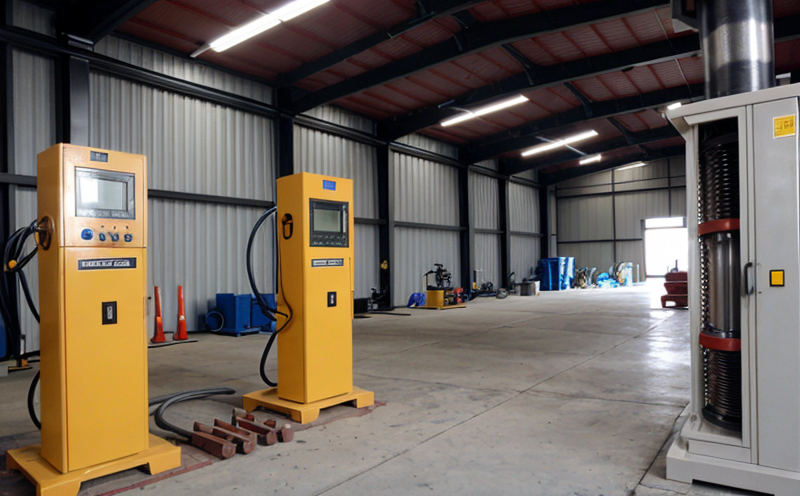ISO 2871-5 Compression and Stackability Test
The ISO 2871-5 Compression and Stackability Test is a critical procedure used to evaluate the mechanical strength and stackability of packaging materials. This test ensures that packages can withstand various environmental stresses, including stacking pressures, without compromising their integrity or functionality.
The primary purpose of this test is to determine whether packaging materials meet specific standards for compressive strength and stability under static loading conditions. It plays a vital role in ensuring the safety, quality, and performance of products during transportation and storage.
During the ISO 2871-5 test, specimens are subjected to controlled compression forces applied either singly or stacked multiple times. The test setup simulates real-world stacking scenarios that packaging might encounter in warehouses or distribution centers. The objective is to assess how well the material performs under these conditions without deforming, collapsing, or failing.
Compliance with ISO 2871-5 is essential for manufacturers and suppliers who need to ensure their products meet regulatory requirements and customer expectations. This test helps identify potential weaknesses in packaging design early on, allowing for improvements before product launch.
The method specifies the use of a compression testing machine capable of applying known loads uniformly across the specimen surface. Specimens are typically cut from larger sheets or rolls according to specified dimensions provided within the standard. After preparation, they are placed into the testing apparatus and subjected to increasing compressive forces until failure occurs or a predetermined load is reached.
Acceptance criteria for this test vary depending on the type of packaging material being evaluated; however, generally speaking, successful samples must maintain their structural integrity throughout the prescribed loading sequence. Failure modes such as crushing, tearing, or delamination would indicate insufficient mechanical strength and stackability properties.
In summary, conducting an ISO 2871-5 Compression and Stackability Test ensures that packaging materials are robust enough to handle the rigors of distribution channels without compromising product safety or quality. By incorporating this test into your quality control processes, you can enhance customer satisfaction while reducing potential risks associated with damaged goods.
Why It Matters
The importance of mechanical strength and stackability in packaging cannot be overstated. Properly designed packages protect contents from damage during handling, shipping, and storage, thereby enhancing overall product safety and customer satisfaction. When packages fail due to inadequate mechanical properties, it can lead to significant financial losses through increased return rates, warranty claims, or even recalls.
From an operational standpoint, reliable packaging also contributes positively towards efficient supply chain management by minimizing space requirements within warehouses and reducing transportation costs associated with lightweight yet bulky containers. Additionally, meeting regulatory standards like ISO 2871-5 demonstrates a commitment to industry best practices and helps build trust among customers who value product integrity.
Furthermore, robust packaging can extend shelf life by protecting goods from environmental factors such as humidity, temperature fluctuations, and physical impacts. This extends the usability of products beyond their intended expiration dates, contributing significantly to sustainability efforts within organizations.
In conclusion, investing in thorough mechanical strength and stackability testing not only protects brands but also supports sustainable business practices that resonate well with environmentally conscious consumers.
Why Choose This Test
Selecting the right packaging solution is crucial for any organization aiming to protect their products effectively. The ISO 2871-5 Compression and Stackability Test offers several advantages over other methods of evaluating mechanical properties:
- Comprehensive Assessment: Unlike simpler tests that focus solely on tensile strength, this test evaluates both compressive resistance and stability under stacked conditions.
- Realistic Simulations: By replicating actual stacking scenarios encountered in logistics environments, the results obtained are more indicative of real-world performance.
- Regulatory Compliance: Ensuring adherence to international standards enhances credibility and opens up new market opportunities domestically and internationally.
- Detailed Reporting: The comprehensive nature of this test provides detailed insights into various aspects of packaging behavior, aiding in informed decision-making processes.
These factors make the ISO 2871-5 Compression and Stackability Test an indispensable tool for companies seeking to optimize their packaging solutions while maintaining high levels of quality assurance.
Competitive Advantage and Market Impact
- Enhanced Reputation: Companies that invest in rigorous mechanical strength testing gain a reputation as leaders in product protection, which can attract more customers and partnerships.
- Informed Decision Making: Access to detailed test results helps R&D teams innovate better designs tailored specifically for target markets.
- Potential Cost Savings: Early identification of problematic areas through testing reduces the likelihood of costly redesigns or rejections later in the production cycle.
- Better Customer Relationships: Meeting stringent quality benchmarks fosters stronger relationships with distributors and end users, leading to increased loyalty and repeat business.
The ability to consistently pass such rigorous tests positions organizations favorably against competitors who may not adhere as closely to established protocols. Moreover, successful compliance with international standards like ISO 2871-5 can open doors to new markets where stringent quality controls are required.





